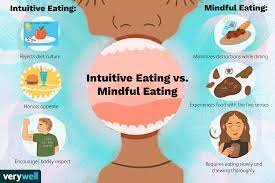In the fast-paced world we live in today, where instant gratification seems to be the norm, one area of our lives often overlooked is our relationship with food. The practice of mindful eating, a time-honored tradition rooted in ancient wisdom, is making a remarkable comeback, and it’s no surprise. With countless individuals seeking a holistic approach to their well-being, mindful eating is gaining momentum for its potential to revolutionize not only our eating habits but also our overall health.
The Essence of Mindful Eating
At its core, mindful eating is about more than just the food you consume; it’s a lifestyle, a philosophy, and a conscious way of engaging with your meals. It involves being fully present during your eating experience, paying attention to the sensations, emotions, and thoughts that arise as you eat.
Tasting Every Flavor
One of the fundamental aspects of mindful eating is savoring each bite. It’s about engaging all your senses to appreciate the flavors, textures, and aromas of your food. By doing this, you not only make your meal more enjoyable but also become aware of your body’s hunger and fullness cues.
The Mind-Body Connection
Mindful eating promotes a profound connection between your mind and body. It encourages you to listen to your body’s signals of hunger and fullness. This connection is crucial for maintaining a healthy weight, as you learn to eat in response to genuine physical hunger rather than emotional triggers.
Freedom from Dieting
Dieting often involves strict rules and restrictions. Mindful eating, on the other hand, is all about freedom. It encourages you to make food choices based on your body’s needs and preferences rather than adhering to external guidelines. This freedom can lead to a healthier and more sustainable relationship with food.
The Health Benefits of Mindful Eating
Now that we’ve touched upon the essence of mindful eating, let’s explore the incredible health benefits it can offer.
Weight Management
Mindful eating can be a game-changer when it comes to weight management. By listening to your body’s hunger and fullness cues, you’re less likely to overeat. This can help you achieve and maintain a healthy weight without the need for restrictive diets.
Improved Digestion
When you eat mindfully, you give your digestive system a helping hand. Chewing your food thoroughly and savoring each bite allows your body to process food more efficiently, reducing the chances of indigestion and other gastrointestinal issues.
Emotional Well-Being
Mindful eating isn’t just about what you eat; it’s about how you eat. By being present during your meals, you can reduce stress and anxiety. This approach helps you better manage your emotions and, in turn, make healthier food choices.
Enhanced Nutrition
When you’re mindful of what you eat, you tend to choose foods that are more nutritious. You’re more likely to opt for whole, unprocessed foods, which are rich in vitamins, minerals, and other essential nutrients.
Mindful Eating for Disease Prevention
Mindful eating can be a powerful tool for disease prevention. By choosing a balanced and nutritious diet, you reduce the risk of chronic diseases such as heart disease, diabetes, and obesity.
Practical Tips for Embracing Mindful Eating
So, you’re convinced of the benefits of mindful eating, and you’re ready to give it a try. Here are some practical tips to help you get started on this transformative journey.
1. Slow Down
Eating mindfully begins with slowing down. Take your time to chew each bite thoroughly. Put your fork down between mouthfuls. This pace allows you to connect with your body’s hunger cues and avoid overeating.
2. Engage Your Senses
As you eat, engage all your senses. Take note of the colors, textures, and aromas of your food. This sensory experience enhances your meal and brings you into the present moment.
3. Listen to Your Body
Pay close attention to your body’s signals. Are you truly hungry, or are you eating out of boredom or stress? Mindful eating helps you distinguish between real hunger and emotional cravings.
4. Minimize Distractions
Eating in front of the TV or computer can lead to mindless overeating. Create a calm and distraction-free environment for your meals.
5. Appreciate Your Food Source
Think about where your food comes from and the effort that went into producing it. This awareness can deepen your connection to the food on your plate.


